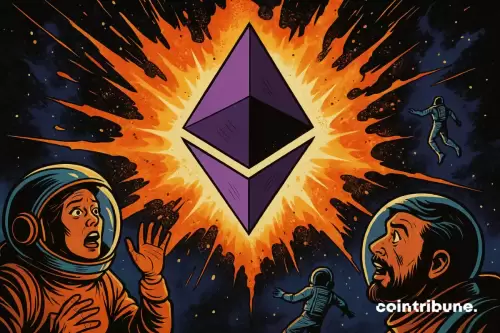 |
|
 |
|
 |
|
 |
|
 |
|
 |
|
 |
|
 |
|
 |
|
 |
|
 |
|
 |
|
 |
|
 |
|
 |
|
Cryptocurrency News Articles
Robert Kiyosaki Slams Fiat Currencies, Calling Them “Fake Money” and Warning Users to Move to Bitcoin
May 10, 2025 at 09:01 pm
Robert Kiyosaki has once again slammed fiat currencies by calling them “fake money” and warning users to move to decentralized assets like Bitcoin
Robert Kiyosaki, the renowned author of "Rich Dad Poor Dad," has once again expressed his disdain for fiat currencies, which he terms "fake money," and urged users to pivot toward decentralized assets like Bitcoin, gold, and silver.
Sharing his thoughts in a post early Saturday, Kiyosaki, known for his outspoken views on finance and economics, cited former Congressman Ron Paul, who has consistently advocated for a return to sound money principles.
Kiyosaki highlighted Paul's warning that central banks "fix prices" through interest rate control, a move which Paul labels Marxist central planning in his book "The Federal Reserve: A Very Personal History."
"Central bank systems aim to confiscate wealth and undermine individual liberties," Paul wrote in his book, as shared by Kiyosaki in the post.
Kiyosaki's post aligns him with libertarian voices who oppose central banking and prefer a decentralized financial system.
"Fake money leads to a dishonest system: fake accounting, fake statistics, fake leadership," stated Kiyosaki, adding that his followers should not "save or earn" in fiat money.
Instead, Kiyosaki urged them to protect their future by adopting real assets.
"Get on your own decentralized gold, silver and Bitcoin standard," he advised.
This stance follows Kiyosaki's long-standing support of Bitcoin as "people's money," which he often promotes as protection against inflation and government overreach.
Kiyosaki's message carries weight as financial institutions grow increasingly involved in the crypto space. However, despite the involvement of large institutions like BlackRock in Bitcoin ETFs, there are still significant hurdles to overcome for broader adoption.
As reported by ChainEdge, a crypto analytics firm, predicts that the Bitcoin price could surge to $670,000 by early 2025 as part of a new bull market cycle. The firm's analysis, which assesses on-chain metrics, suggests that BTC's price will enter a steeper ascent as the halving approaches in 2024.
Most financial experts are speculating about how much the Bitcoin price will appreciate. Prominent individuals such as Arthur Hayes and Robert Kiyosaki are forecasting BTC to reach $1 million in the not-so-distant future.
Such lofty forecasts are coming as concerns grow about economic stability worldwide in the ongoing U.S.-China war.
And it looks like the U.S. regulators have also started to listen as Robert Kiyosaki pushes for sound money and decentralized finance. For instance, the Federal Reserve just removed strict rules on crypto banking, which also opens the door for wider adoption.
Disclaimer:info@kdj.com
The information provided is not trading advice. kdj.com does not assume any responsibility for any investments made based on the information provided in this article. Cryptocurrencies are highly volatile and it is highly recommended that you invest with caution after thorough research!
If you believe that the content used on this website infringes your copyright, please contact us immediately (info@kdj.com) and we will delete it promptly.
-

-

-

- Remittix, Shiba Inu and Pi Network Discuss Their Chances of Breaking Into Crypto 10
- May 11, 2025 at 04:00 am
- As the market evolves, a new wave of performers is rising to challenge established projects with immovable market caps. Shiba Inu, PI coin, and Remittix are the projects quietly positioning themselves for a leap into the top 10 crypto spot.
-

-

-

-

- Can a blockchain project still scale without solving actual user friction? That question won't go away—and Polkadot just reignited it.
- May 11, 2025 at 03:50 am
- After years of debate, Polkadot's modularity framework has finally taken center stage. It's no longer just about scalability—it's about interoperability
-

-




























































